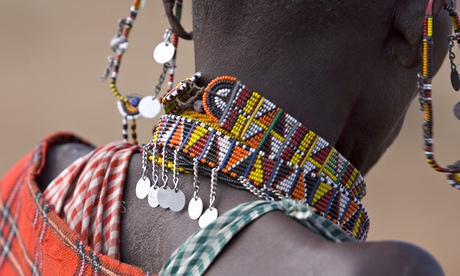Violence Against Women
Source: The Guardian
A Masai couple charged with the murder of a girl who was in their care and bled to death after being subjected to female genital mutilation pleaded not guilty in a Kenyan court on Wednesday.
Thirteen-year-old Raima Ntagusa died on 13 April after being cut at a remote homestead in Kajiado county, south of Nairobi. The procedure went wrong and her body was found in a pool of blood, with a shallow grave already dug nearby.
The guardians of the girl – Jackson Lesale Lanoi and his wife Eunice Sintana Lesale, who nursed her four-month-old baby in the dock throughout the proceedings – pleaded not guilty to murder at the Machakos high court.
The couple – who have been remanded in custody since 15 April – were refused bail. The prosecutor opposed their release on the grounds that they come from the same area as the witnesses in the case and that they posed a flight risk. A bail hearing has been set for 26 June.
The couple also face charges in a lower court of aiding and abetting FGM. Another woman was charged alongside the couple in both cases, but the murder charge against her was recently dropped.
Dozens of friends and relatives of the couple gathered outside the one-room court, where proceedings where delayed while a Masai interpreter was found.
"We have been practising female circumcision since time immemorial," a Masai man, who asked not to be named, said. "This is just one of the rare cases where somebody has died from the rite, there is nothing criminal about it."
But Christine Nanjala, the head of a newly formed anti-FGM unit in Kenya's Office of the Director of Public Prosecutions, said: "We hope these cases will act as a deterrent, and will bring out that the law is being enforced."A day earlier in Kajiado – the same part of rural Kenya where Ntagusa died – scores of Masai women marched in support of FGM, saying that it was part of their culture and the government should allow the practice.
The demonstration reportedly descended into violent scuffles, in which three journalists covering the march and at least one local representative were injured. Accounts by the journalists involved suggest that the protesters accused them and the officials of being part of the government's fight against FGM.
According to a 2009 public health survey, 73% of women in Kenya's asai ethnic community have been subjected to FGM. The same survey found that 27% of women across the country have been cut, despite the outlawing of the practice in 2001.

"Communities feel that they are being victimised by the government, many resent the law," said Wanjala Wafula, founder of Coexist Initiative, an organisation that brings men and boys together in the fight against gender-based violence in Kenya.
"The whole epidemic has gone underground in Kenya. We are now seeing some communities circumcising girls a few hours after birth so that they can avoid detection later on," he added.
Stiffer legislation against FGM was passed in 2011, making it illegal to promote or facilitate the practice, but awareness of the law remains low. Of the 71 FGM cases taken to court since 2011, police statistics suggest that convictions have been secured in 16 cases; 33 are still pending before the court. Activists describe corruption as a major barrier to gathering sufficient evidence to successfully prosecute perpetrators of FGM. Many witnesses are also unwilling to testify.
Kenya's 20-strong anti-FGM prosecution unit, which was established in April this year, is deploying teams across the country in an attempt to prosecute more cases.
"We are explaining to community and religious leaders and other officials around the country that this is what the law provides," explained Nanjala. "This is a crime, these are the consequences. We are now prosecuting, this is not a negotiation.
"The levels of secrecy are very high,"she added. "If we can get the goodwill of the community leaders we could go a long way."
Since its inception, the anti-FGM prosecution unit has brought several cases to court, including the case being heard in Machakos and another case against a chief who sought to circumcise his own daughters.
"We hope that this [Machakos case] will be a pacesetter for future prosecutions. The relationship between the director of public prosecutions and civil society is more collaborative now," said Wafula, whose organisation works with community whistleblowers to help identify girls at risk.
Kenya's first lady, Margaret Kenyatta, recently added her voice to the call for the eradication of FGM in the country. At an alternative rites of passage event in Kajiado – in which over 270 girls graduated to womanhood without being cut – Mrs Kenyatta called on Kenya to "achieve a zero FGM status".
"You are a testimony that culture is dynamic and that communities need to embrace and retain what is good while doing away with retrogressive parts," she said, addressing the girls participating in the ceremony.
"Let us all declare today that FGM is not necessary in the 21st century."
